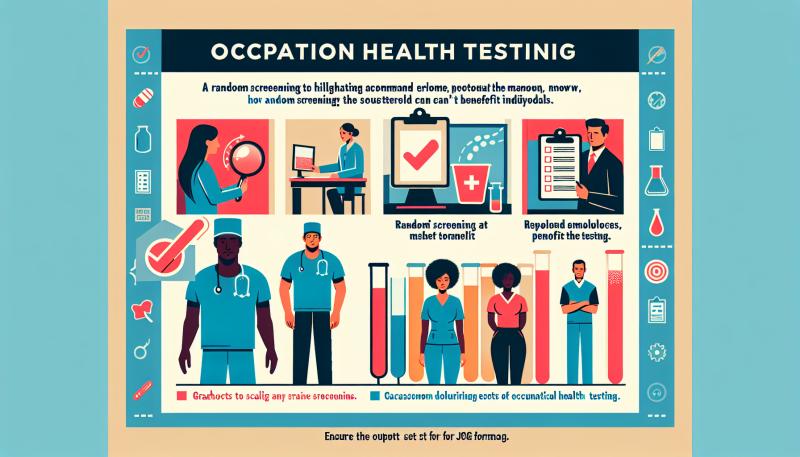
Occupational Health Testing: How Random Screening Can Benefit You
In today's fast-paced world, ensuring a safe and healthy workplace is paramount. For individual consumers, understanding the value and processes involved in occupational health testing can offer peace of mind and further personal and professional growth. Random screening, a method employed by businesses to maintain workplace safety, is a critical component of occupational health testing. By examining the benefits this testing brings, individuals can appreciate its role in enhancing health and safety standards. This article sheds light on the various advantages of occupational health testing and the implementation of random screening.
What is Occupational Health Testing?
Occupational health testing refers to a range of medical tests and assessments carried out to ensure that employees are fit for work and pose no health risks to themselves or others. It is a proactive approach to prevent work-related injuries and illnesses by identifying health issues early and promoting a culture of wellbeing within organizations. Typically, occupational health testing can include physical assessments, drug and alcohol testing, audiometric testing, lung function testing, and more.
The Significance of Random Screening
Random screening is a type of occupational health testing where employees are selected at random to undergo health assessments. Unlike pre-employment testing, which is conducted before hiring, random screening is performed intermittently during employment. This process is crucial for maintaining safety standards, as it ensures that all employees, regardless of their position or tenure, remain healthy and fit to carry out their duties safely.
Benefits of Random Screening for Individual Consumers
For individual consumers, participation in random screening can offer multiple benefits, ranging from enhancing personal health to contributing to overall workplace safety. Here’s how:
- Early Detection of Health Issues: Random screenings can identify health problems before they become serious. Routine health checks can detect not only workplace-related health issues but also other undiagnosed conditions, enabling prompt intervention and treatment.
- Promoting a Drug-Free Workplace: Random drug and alcohol testing are essential components of occupational health programs. For individuals, this not only ensures a safe work environment but also helps individuals who may have substance abuse issues to receive support and treatment.
- Enhancing Personal Responsibility: Knowing that random screenings occur can encourage individuals to take better care of their health. It instills a sense of responsibility towards maintaining a healthy lifestyle, which can lead to improved life quality and longer-term health benefits.
- Reducing Workplace Hazards: By weeding out safety risks associated with unfit or impaired workers, random screening helps ensure that workplace accidents and injuries are minimized, leading to a safe and productive work environment for all.
- Boosting Morale and Productivity: When employees know that their health and safety are a priority, it can boost morale. A contented workforce is proven to be more productive, leading to beneficial outcomes for both employees and the organizations they work for.
IMS Screening Solutions and Their Role in Occupational Health Testing
For those looking for reliable partners in implementing occupational health testing and random screening, companies like IMS Screening Solutions provide robust and comprehensive services. Visit their website at imsscreenings.com to understand their offerings and how they can help ensure thorough and effective health testing tailored to specific needs.
Preparing for Random Screening
Individual consumers may wonder how they should prepare for random occupational health screenings. Here are a few tips:
- Maintain Regular Health Check-Ups: Stay on top of your health by scheduling regular appointments with your healthcare provider. This way, you'll be aware of any potential health issues before your occupational health screening.
- Avoid Alcohol and Drugs: Refrain from consuming alcohol and non-prescribed drugs, not only for passing potential drug screenings but also for your overall well-being.
- Stay Informed: Educate yourself about the types of tests you might encounter. Knowledge can help reduce anxiety associated with testing and help you prepare appropriately.
The Future of Occupational Health Testing
As global awareness of health and safety in the workplace grows, the role of occupational health testing will continue to expand. Advances in technology and health care will likely make testing more efficient and comprehensive, thereby enhancing its effectiveness. Moreover, as businesses become increasingly committed to building safer work environments, random screenings will play a pivotal role in achieving these goals.
For individual consumers, staying informed and understanding the significance of these tests can empower them to take full advantage of the health benefits and safety assurances they provide.
Conclusion
Occupational health testing, particularly random screening, offers numerous benefits for both employers and individual employees. By ensuring early detection of health issues, promoting a drug-free workplace, and reducing workplace hazards, these tests contribute significantly to personal and professional well-being. Organizations, supported by companies like IMS Screening Solutions, are better positioned to create safer, more productive work environments. As the landscape of workplace health and safety continues to evolve, so too will the methods and impact of random screening, ensuring that its role remains central to the continued improvement of occupational health standards.
